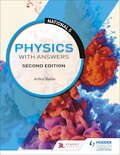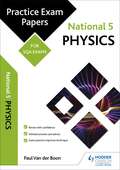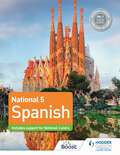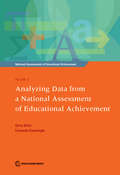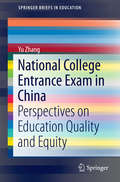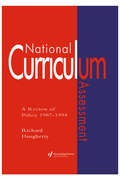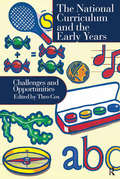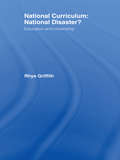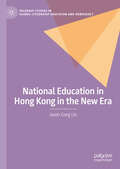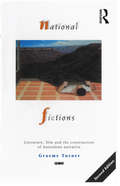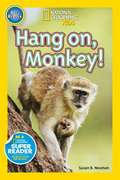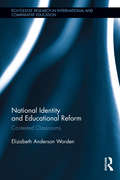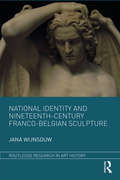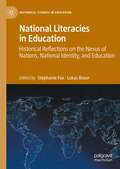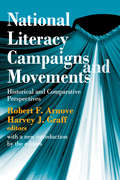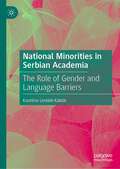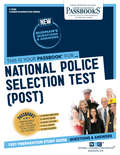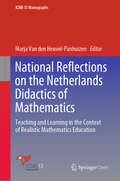- Table View
- List View
National 5 Physics with Answers, Second Edition
by Arthur BaillieExam Board: SQALevel: National 5Subject: PhysicsFirst Teaching: September 2017First Exam Summer 2018This second edition has been comprehensively updated to reflect the changes made by the SQA to the National 5 Course Specification with chapters on the following areas of physics: Electricity, Properties of matter, Waves, Radiation, Dynamics, and Space.- Covers the new specification with all the new topics in the SQA examinations- Provides thorough exam preparation, with practice exercises- Organised to make it easy to plan, manage and monitor student progress
National 5 Physics with Answers: Second Edition Epub
by Arthur BaillieExam Board: SQALevel: National 5Subject: PhysicsFirst Teaching: August 2017First Exam: May 2018This second edition has been comprehensively updated to reflect the changes made by the SQA to the National 5 Course Specification with chapters on the following areas of physics: Electricity, Properties of matter, Waves, Radiation, Dynamics, and Space.- Covers the new specification with all the new topics in the SQA examinations- Provides thorough exam preparation, with practice exercises- Organised to make it easy to plan, manage and monitor student progress
National 5 Physics: Practice Papers for SQA Exams
by Paul VanderboonPractise for your SQA exams with three specially commissioned Hodder Gibson Practice Exam Papers with fully worked answers.- Practise with model papers written and checked by experienced markers and examiners- Worked answers show how solutions are arrived at and where marks are gained- Get extra advice with study-skills guidance sections- Avoid common mistakes with examiner tips- A revision grid allows students to revise by topic
National 5 Spanish: Includes support for National 3 and 4
by Mike Thacker Tony Weston Mónica Morcillo Laiz Simon Barefoot Timothy Guilford José Antonio Sánchez Alison Smart Mary Ann McAlindenRely on resources for Scotland, from Scotland, to meet the needs of every student. With differentiation at its core, this course provides appropriate support, structure and challenge for all learners.Students will enjoy developing their skills, knowledge and appreciation of the Spanish language and the culture of Spanish-speaking countries.> Trust Scotland's No.1 educational publisher. Written specifically for the Scottish curriculum, this book covers the specified contexts of society, learning, employability and culture, with each double-page spread containing the content for one lesson.> Practise and strengthen skills. Every lesson includes high-quality reading, writing, speaking, listening and grammar exercises. Vocabulary lists for each context and a 30-page grammar chapter help students to build from a strong foundation. Four 'magazines' offer extra insight and reading practice.> Ensure access for everyone. The content is differentiated into three difficulty levels, enabling students to work independently, follow a clear pathway and feel confident in their progress. The first two difficulty levels are also suitable for N3 and N4, so you have a single, cost-effective resource for all stages.> Prepare for assessment success. Each section ends with a 'revision corner', which comprises exam-style questions, model answers and advice on the N5 exam, written assignment and performance.Please note: The audio files to accompany the listening tasks are not included with this book.> Individual customers (students, parents/carers and tutors) can access the audio by subscribing to the Boost eBook, available to purchase at hoddergibson.co.uk/n5-languages. A Boost eBook subscription permits access to the audio for one user only and cannot be shared with others.> Schools/colleges can access the audio by subscribing to the Boost teaching and learning resources at hoddergibson.co.uk/n5-languages
National 5 Spanish: Includes support for National 3 and 4
by Mike Thacker Tony Weston Mónica Morcillo Laiz Simon Barefoot Timothy Guilford José Antonio Sánchez Alison Smart Mary Ann McAlindenRely on resources for Scotland, from Scotland, to meet the needs of every student. With differentiation at its core, this course provides appropriate support, structure and challenge for all learners.Students will enjoy developing their skills, knowledge and appreciation of the Spanish language and the culture of Spanish-speaking countries.> Trust Scotland's No.1 educational publisher. Written specifically for the Scottish curriculum, this book covers the specified contexts of society, learning, employability and culture, with each double-page spread containing the content for one lesson.> Practise and strengthen skills. Every lesson includes high-quality reading, writing, speaking, listening and grammar exercises. Vocabulary lists for each context and a 30-page grammar chapter help students to build from a strong foundation. Four 'magazines' offer extra insight and reading practice.> Ensure access for everyone. The content is differentiated into three difficulty levels, enabling students to work independently, follow a clear pathway and feel confident in their progress. The first two difficulty levels are also suitable for N3 and N4, so you have a single, cost-effective resource for all stages.> Prepare for assessment success. Each section ends with a 'revision corner', which comprises exam-style questions, model answers and advice on the N5 exam, written assignment and performance.Please note: The audio files to accompany the listening tasks are not included with this book.> Individual customers (students, parents/carers and tutors) can access the audio by subscribing to the Boost eBook, available to purchase at hoddergibson.co.uk/n5-languages. A Boost eBook subscription permits access to the audio for one user only and cannot be shared with others.> Schools/colleges can access the audio by subscribing to the Boost teaching and learning resources at hoddergibson.co.uk/n5-languages
National Assessments of Educational Achievement, Volume 4
by Fernando Cartwright Gerry ShielEffective assessment of the performance of educational systems is a key component in developing policies to optimize the development of human capital around the world. The five books in the National Assessments of Educational Achievement series introduce key concepts in national assessments of student achievement levels, from policy issues to address when designing and carrying out assessments through test development, questionnaire design, sampling, organizing and carrying out data collection, data cleaning, statistical analysis, report writing, and using results to improve educational quality. Analyzing Data from a National Assessment of Educational Achievement is the fourth of five volumes in the National Assessments of Educational Achievement series. Other volumes have described the procedures in an assessment up to the point when data have been prepared for statistical analysis, the topic of this volume. The precise analyses that are carried out will depend on the information needs of policy makers and education managers. In most national assessments, these relate to the quality of student learning, factors related to learning, equity issues, and in some cases, change in educational outcomes over time. Volume 4, which comprises two parts, provides step-by-step details on how to analyze data collected in a national assessment. Part I provides a general introduction to statistical analyses normally carried out in large-scale assessments, measuring central tendency and dispersion of student scores and relationships between variables. Part II describes IATA (Item and Test Analysis) software, which uses classical test and item response theories to establish scales on which to report student scores. Steps in the analysis of pilot and final test administrations are described in detail. An accompanying CD contains specially designed exercises and supporting data files for both parts of the volume. This book will be of interest to assessment specialists in national, regional, and local governments, research institutions, and universities.
National Bank of Poland
by Piero UgoliniPoland was the first centrally planned economy in Eastern Europe to leave the Soviet bloc and introduce systemic reforms in all sectors of the economy. the transformation of the National Bank from a monobank to an institution of a market-based system and the Polish financial sector into a market-oriented banking system was an important element of the reform process and received strong support from the IMF and the international community. This paper describes the steps taken by the National Bank, analyzes the monetary situation, and makes recommendations.
National College Entrance Exam in China
by Yu ZhangThis book focuses on the National College Entrance Exam (NCEE), an important measurement of education quality in China, from both education economics and education policy perspectives. It provides a better understanding and stimulates more sophisticated evaluations of NCEE-related policies in China from the perspectives of education equity, the effectiveness of education input, and education quality. This book reports inspiring findings based on high-quality individual level data, innovative measurement design, and various appropriate identification strategies. The most import conclusion is that both education equity and quality can be achieved using well-designed policies based on solid empirical evidence. This is likely the first book published in English to discuss the NCEE so extensively from multiple perspectives using concrete evidence.
National Curriculum Assessment: A Review Of Policy 1987-1994
by Richard DaughertyThe assessment of the National Curriculum has evolved from the first blueprint of the TGAT Report through a series of policy decisions and early experience of implementation. The pace of change, the complexity of the proposed assessment system and the political rhetoric associated with it have served to confuse and so obscure the trends in policy and practice. This book offers an account of that system and explains why it is now emerging in a substantially different form from that envisaged by its originators.
National Curriculum In The Early Years: Challenges And Opportunities
by Theo CoxThe child-centred principles of early years education - which emphasize play and holistic learning - are being challenged by the implementation of a subject-based National Curriculum. The contributors to this book explore this challenge and offer some ways of meeting it practically and productively. Issues covered include: pedagogical issues, such as the cross-curricular, topic-based teaching; teacher's attitudes to subject knowledge; assessment issues, including baseline assessment at the age of five; and parental attitudes to the National Curriculum and its content at Key Stage 1.
National Curriculum: Education and Citizenship
by Dr Rhys Griffith Rhys GriffithNational Curriculum: National Disaster? looks beyond the classroom and discusses the way in which the infrastructure of school codes of conduct, the physical environment of school sites and the hierarchy of human resources within schools impact on the aims and reality of the National Curriculum. An alternative skills-based educational programme is also outlined which may be more likely to fulfil the expectations that many parents now hold for the education of their children.
National Education in Hong Kong in the New Era (Palgrave Studies in Global Citizenship Education and Democracy)
by Jason Cong LinThis book provides a comprehensive, up-to-date picture of national education in Hong Kong. At the societal level, it offers an in-depth understanding of a divisive issue for Hongkongers, elaborating the official approach so that diverse stakeholders have a basis for re-evaluating the nature and implementation of national education for rational and critical dialogue. At the policy and curricular level, it offers evidence-based suggestions to foster inclusive and reflective decision-making and curriculum development related to national education. At a practical level it facilitates the teaching of national education in schools and helps diverse stakeholders to reflect on how national education relates to them, and what they can do to co-construct an inclusive and reflective national education. The book will interest researchers in multicultural education, national identity, identity politics and China and Hong Kong Studies.
National Fictions: Literature, film and the construction of Australian narrative
by Graeme TurnerNational Fictions is a study of Australian literature and film. It is also a study of Australian culture, viewing the novels and films as products of a specific culture - as narratives with similar structures, functions, forms and meanings. It covers a wide range of texts, offering both close analysis and an account of their place within the system of meanings the book proposes as dominant in Australian culture.The second edition of this influential work includes a new Afterword which traces recent changes in Australian literature and film, examining the growth of women's writing and popular fiction, as well as current trends in Australian cinema. Turner asks whether these developments really mark a shift in the Australian narrative, and whether it is still possible to speak in terms of a national culture.'.a ground-clearing book. a seminal work, setting an agenda for cultural studies beyond the stockyards and croquet lawns of literary criticism.' - David Carter, Australian Literary Studies'As a global syncretist, Turner is without peer.' - Stuart Cunningham, Media Information Australia
National Geographic Reach: Language, Literacy, Content [Level D, Grade 3]
by Lada Kratky Nonie K. Lesaux Nancy FreyNIMAC-sourced textbook
National Geographic Reach: Language, Literacy, Content [Level E, Grade 4]
by Lada Kratky Nonie K. Lesaux Nancy FreyReach Lvl E TX Student Anthology
National Geographic Reach: Language, Literacy, Content [Level F, Grade 5]
by Lada Kratky Nonie K. Lesaux Nancy FreyReach Lvl F TX Student Anthology
National Geographic Reach: Languange, Literacy, Content
by Lada Kratky Nonie K. Lesaux Nancy FreyNIMAC-sourced textbook
National Geographic Readers: Hang On, Monkey!
by Susan B. NeumanHang On, Monkey! uses simple vocabulary and fun pictures to capture the interest and help develop the skills of beginning readers. The crazy antics, humor, and fun information make this new reading experience a treat.
National Identity and Educational Reform: Contested Classrooms (Routledge Research in International and Comparative Education)
by Elizabeth Anderson WordenNational identity in Moldova remains contested despite repeated attempts by governments, historians, and educators to cultivate a shared sense of national belonging through the development of history textbooks. Concern over professional status and distrust of the government’s motivations halted these reforms, demonstrating that the success of such efforts greatly depends on teachers’ and citizens’ social memory and everyday lives. This volume looks at educational reform and the struggle over national identity in the history classroom from the perspectives of five different groups: elected politicians, Ministry of Education officials, textbook authors and historians, teachers, and students. Each chapter explores the actors’ motivations and agendas regarding reform, their role in promoting or obstructing the reform process, and their opinions about the ensuing controversy. Drawing on months of fieldwork and original research, author Elizabeth Worden examines the importance of teachers and students in the success or failure of a reform initiative.
National Identity and Nineteenth-Century Franco-Belgian Sculpture (Routledge Research in Art History)
by Jana WijnsouwThis book elaborates on the social and cultural phenomenon of national schools during the nineteenth century, via the less studied field of sculpture and using Belgium as a case study. The role, importance of, and emphasis on certain aspects of national identity evolved throughout the century, while a diverse array of criteria were indicated by commissioners, art critics, or artists that supposedly constituted a "national sculpture." By confronting the role and impact of the four most crucial actors within the artistic field (politics, education, exhibitions, public commissions) with a linear timeframe, this book offers a chronological as well as a thematic approach. Artists covered include Guillaume Geefs, Eugène Simonis, Charles Van der Stappen, Julien Dillens, Paul Devigne, Constantin Meunier, and George Minne.
National Literacies in Education: Historical Reflections on the Nexus of Nations, National Identity, and Education (Historical Studies in Education)
by Stephanie Fox Lukas BoserThis edited volume provides an international overview of research on nationalism in education. In light of emerging neo-nationalism and national answers to global challenges, the book contributes to a growing and desperately needed discussion on how we can understand and deal with the involvement of education in phenomena of nations and nationalisms in school, curriculum, theory and research. In this book, internationally renowned scholars as well as doctoral students and postdocs from Asia, Europe, America, and Australia show how the history of education can theoretically and empirically deal with the concept(ion)s of nation and nationalism.
National Literacy Campaigns and Movements: Historical and Comparative Perspectives
by Jose Carlos ChiaramonteMajor campaigns to raise levels of literacy have taken place for centuries and share many common elements. But despite literary campaigns spanning over five decades, 860 million adults still lack minimal ability to read, write, and calculate. Why is literacy of such great importance and why have so many years of campaigning for it not been successful in fully overcoming this obstacle? "National Literacy Campaigns and Movements" explores these questions by examining campaigns in vastly different societies from a historical and comparative perspective.The volume focuses on literacy movements from the past, including those of Reformation Germany, early modern Sweden and Scotland, nineteenth-century United States, nineteenth- and early twentieth-century Russia and the Soviet Union, pre-Revolutionary and Revolutionary China, and Tanzania, Cuba, Nicaragua, and India. Contributors analyze literacy goals and outcomes in specific contexts. The editors distinguish quantitative and qualitative dimensions of literacy activities, such as the difference between the spread of literacy and patterns of its use. The common enterprise of this book is to expand upon the contributors' previous research to include a comparative dimension.This book offers the first systematic attempt to examine, critically and comparatively, the concepts and facts of large-scale literacy campaigns in more than a dozen societies over nearly five-hundred years. It offers a valuable historical lesson not only for historians, but also for educators: that instead of concentrating only on the recent period, we should use the vast and complex history of literacy movements to shed understanding on the present and future of literacy. A major new introduction to this edition asserts recent literary campaigns and the lessons provided by their success and failures. It also describes how the focus of some movements has evolved.
National Minorities in Serbian Academia: The Role of Gender and Language Barriers
by Karolina Lendák-KabókThis book offers an intersectional analysis of secondary and tertiary educational pathways of ethnic Hungarians, Romanians and Slovaks in the Autonomous Province of Vojvodina, Serbia. After a detailed overview of the legal and institutional context of national minority education in Serbia, the book presents qualitative and quantitative research results to illuminate the often invisible linguistic and cultural barriers that national minority high school graduates, university students and faculty may encounter. The author also focuses on the position of national minority women in Serbian higher education and academia, shedding light on the very gendered nature of the ‘glass ceiling’ that often holds members of national minority communities back from career building. This book will be of interest to policymakers seeking nuanced interpretations of multifocal inequalities, as well as academics in fields such as gender studies, migration studies, minority languages and communities, and the sociology of education.
National Police Selection Test: Passbooks Study Guide (Career Examination Series #C-3596)
by National Learning CorporationThe National Police Selection Test (POST) Passbook® prepares you for your test by allowing you to take practice exams in the subjects you need to study. It provides hundreds of questions and answers in the areas that will likely be covered on your upcoming exam, including but not limited to: police knowledge, background, skills, and judgment in and for law enforcement situations; understanding and interpreting written material; report writing; arithmetical reasoning; and more.
National Reflections on the Netherlands Didactics of Mathematics: Teaching and Learning in the Context of Realistic Mathematics Education (ICME-13 Monographs)
by Marja Van den Heuvel-PanhuizenThis open access book, inspired by the ICME 13 Thematic Afternoon on “European Didactic Traditions”, consists of 17 chapters, in which educators from the Netherlands reflect on the teaching and learning of mathematics in their country and the role of the Dutch domain-specific instruction theory of Realistic Mathematics Education.Written by mathematics teachers, mathematics teacher educators, school advisors, and developers and researchers in the field of instructional material, textbooks, and examinations, the book offers a multitude of perspectives on important issues in Dutch mathematics education, both at primary and secondary school levels. Topics addressed include the theoretical underpinnings of the Dutch approach, the subject of mathematics in the Dutch educational system, teacher education and testing, the history of mathematics education and the use of history in teaching of mathematics, changes over time in subject matter domains and in the use of technology, and the process of innovation and how the Dutch and in particular one Dutch institute have worked on the reform.
